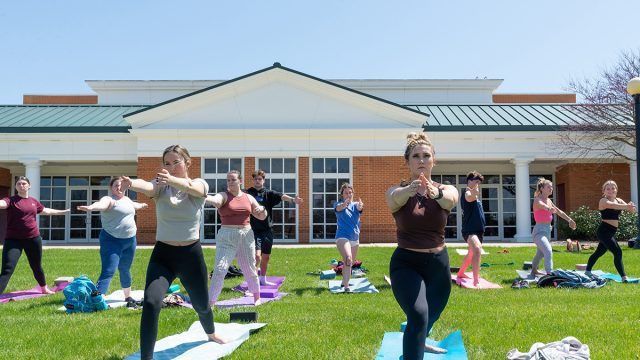Caring for your body and mind
Bridgewater’s Student Health Center, Counseling Center, and Wellness Programming take a holistic approach to student wellbeing. We strive to empower students to become more responsible and proactive in their own physical, emotional, and social health.
Our medical practitioners provide initial consultation, evaluation, treatment, and follow up for illnesses and injuries. All services and supplies provided at Health Services are free of charge to any student, whether they are full time or part time, resident or non-resident. There are times when the provider may determine that a student’s specific injury or illness should be treated by a specialist, may require additional procedures (x-ray, lab work, etc.) or treatment at a more advanced facility. When that occurs, it is recommended that the student collaborate with their health insurance provider to determine what additional costs may be incurred by the referral as any off-campus service and all prescription medications are the student’s financial responsibility.
The following diagnostic tests are available at no charge to the student, upon the order of our provider:
RAPID STREP TEST | MONO TEST | ROUTINE URINALYSIS | PREGNANCY TEST | TB TESTS
In compliance with Virginia state law, Bridgewater College requires entering students to provide immunization documentation of the vaccines listed, in order to continue to be registered and participate in classes:
- Current TDAP – within 10 years
- Hepatitis B – 3 dose series
- Meningitis (MenACWY or MenB) (at age 16-23)
- Varicella
- Measles, Mumps, Rubella (MMR) Vaccine (Two doses of MMR at least 28 days apart after 12 months of age.) INDICATIONS:
- All college students born after 1956 without evidence of immunity* should receive 2 doses of MMR vaccine. (*Evidence of immunity is assumed if born before 1957, documentation of receipt of MMR vaccine, or laboratory evidence of immunity or disease*)
- All health care professional students without evidence of immunity should receive two doses of MMR (if they do not have documentation of having had 2 MMR doses)
At institutions of higher education, the confidentiality of medical records is governed by the Family Educational Rights and Privacy Act (FERPA). Information contained in the medical and mental health record of each student is confidential and may not be released to anyone outside of the College, including parents, without written permission from the student, except under specific emergency circumstances as outlined by the Code of Virginia. If a student has any chronic condition, takes special medication, or needs specific health treatment, it is recommended that they make these needs known to the appropriate department. If the student lives with a condition (i.e. insulin dependent diabetes or a history of seizures, etc.) that may require emergency assistance at some point, it may also be helpful to notify Residence Life Professional Staff.
We encourage all students to maintain comprehensive, primary health insurance coverage while enrolled at Bridgewater. Students are responsible for all medical expenses, except for those provided by the Student Health Center. The College does not provide student health insurance.
F-1 international students: Before coming to Bridgewater, you are required to prove you have sufficient health insurance coverage from a U.S.-based provider. Contact Anne Marsh at atmarsh@bridgewater.edu to review policy details before you purchase any plan.
If a student experiences a medical or mental health emergency after our offices are closed, there are a number of resources available:
- Call 911. The Bridgewater Rescue Squad is located less than a mile from campus and provides prompt, professional service in conjunction with the Sentara RMH Medical Center in Harrisonburg, approximately nine miles from campus.
- Contact a Residence Life Professional Staff Member (Area Coordinator or Residential Advisor) who is able to consult with medical professionals after hours and assist in identifying the most appropriate response and/or resource
Augusta Health Urgent Care
Website
1140 Keezletown Road
Weyers Cave, VA
540-453-0040
Hours: Monday through Friday 9 a.m. – 7 p.m., Saturday and Sunday 9 a.m. – 5 p.m.
Walk-in, no appointment needed
EmergiCare
Website
343 Neff Ave., Suite C
Harrisonburg, VA
Hours: Monday through Friday 9 a.m. – 7 p.m., Saturday 9 a.m. – 3 p.m., Sunday 1 p.m. – 6 p.m.
540-432-9996
Walk-in, no appointment needed
Cooks Creek Clinic
2323 Grace Chapel Road
Harrisonburg, VA
540-433-3889
Hours: Monday through Friday 8 a.m. – 4 p.m.
Call for same day appointment
Carilion Clinic Family Medicine
Website
100 Health Center Drive
Bridgewater, VA
540-828-2634
The Bridgewater College Counseling Center stands ready to assist students in resolving their mental health concerns. Each year, a significant number of students utilize the Counseling Center as a means to address the emotional stressors that impact their day-to-day experience on campus. The Counseling Center is composed of licensed professional counselors, residents in counseling and graduate counseling interns who are prepared to provide quality mental health services. Treatment at the Bridgewater Counseling Center takes a holistic, solution-focused approach to healing and begins with individual therapy. Referrals for additional services (e.g., long-term therapy, group services, health services, academic services, specialized treatment, etc.) are made as needed. The staff works closely with campus partners to ensure campus resources are utilized and students are provided with the most comprehensive care as possible.
Bridgewater College Student Wellness takes a proactive approach to health and wellness through various promotion, awareness, and prevention efforts. Professional staff and student groups provide training and programming on a variety of topics including mental health, substance abuse, and sexual violence prevention.Throughout the academic year, there are wellness events where students can engage with and learn about the facets of wellness. Some of the major wellness events include Walk for Hope, an annual event focused on suicide prevention, and Red Flag week, which raises awareness about unhealthy relationships. Other events include Welcome Week, alcohol safety and healthy relationships presentations, bi-weekly therapy dog visits, bystander intervention training, the Clothesline Project, Finals Week wellness care packages, Take Back the Night, and more!
We have several student organizations dedicated to wellness, including Active Minds and BC United. Active Minds focuses on raising awareness about, advocating for, and decreasing stigma around mental health with events throughout the year. BC United provides programs and training to student organizations and athletic teams about bystander intervention, healthy relationships, and substance abuse.
Physical fitness is an important part of your personal development. You’ll find something for every fitness level at Bridgewater.
The Funkhouser Center for Health and Wellness is just steps away from your residence hall. Try out our treadmills, elliptical cross trainers and stationary bicycles. Take a yoga or cycling class. Build strength using free weights or selectorized weight machines. You can also make use of the fitness room in the Wright/Heritage Link. Or visit the indoor pool in Nininger Hall.
What is sexual health?
Sexual health is “a state of physical, emotional, mental and social well-being in relation to sexuality; it is not merely the absence of disease, dysfunction or infirmity. Sexual health requires a positive and respectful approach to sexuality and sexual relationships, as well as the possibility of having pleasurable and safe sexual experiences, free of coercion, discrimination and violence. For sexual health to be attained and maintained, the sexual rights of all persons must be respected, protected and fulfilled” (WHO, 2006a).
Why is sexual health important?
Sexual health has a direct effect on and is directly affected by other areas of health, including but not limited to physical, emotional, social, and mental health. It is important to stay well-informed on ways to practice safe sexual health so that you are respectful to yourself and other individuals.
Good ways to practice good sexual health (include drop down info below each of these bullet points):
- Consent
- What is Consent?
- Consent is informed, freely and actively given, and mutually understandable words or actions that indicate a willingness to participate in mutually agreed-upon sexual activity. We can remember what consent is by using the acronym F.R.I.E.S. (Freely Given, Reversible, Informed, Enthusiastic, and Specific)
- Protection
- It is extremely important that if you choose to be sexually active, that you and your partner(s) use measure to protect yourselves against STDs and unplanned pregnancies. These can include (but are not limited to):
- Condoms
- 85% effective as the only form of birth control. Condoms are a physical barrier used during intercourse that prevents pregnancy by stopping sperm from getting into the vagina. Latex and non-latex condoms can also protect against STDs when used properly during oral, anal, or vaginal sex. While most condoms are made to cover the penis during intercourse there are also internal condoms that are inserted into the vagina prior to intercourse. Internal condoms have a lower effectiveness as a form of birth control at 79% effective.
- Birth Control Pills
- 91% effective as a form of birth control. Birth control pills are used by individuals assigned female at birth and contain hormones that stops ovulation and thicken the mucus on the cervix to prevent fertilization of an egg by a sperm. Birth control pills come in a pack and are taken once a day at the exact same time. It does not protect against STDs.
- Patch
- 91% effective as a form of birth control. Similar to the birth control pill the patch is a hormonal birth control. The patch is used by individuals assigned female at birth. The patch is placed on the skin in specific areas, typically the stomach or back, and releases hormones to stop ovulation and thicken the mucus on the cervix to prevent fertilization of an egg by a sperm. The patch must be replaced weekly. It does not protect against STDs.
- Shot
- 94% effective as a form of birth control. The birth control shot is given by a healthcare provider once every three months. The shot is used by individuals assigned female at birth. The shot is a form of hormonal birth control that releases hormones to stop ovulation and thicken the mucus on the cervix to prevent fertilization of an egg by a sperm. It does not protect against STDs.
- Implant
- 99% effective as a form of birth control. The birth control implant or Nexplanon is a small, thin rod that is inserted into the upper arm. The birth control implant is used by individuals assigned female at birth. The implant is a form of hormonal birth control that releases hormones to stop ovulation and thicken the mucus on the cervix to prevent fertilization of an egg by a sperm. The implant can last up to five years. It does not protect against STDs.
- Diaphragm
- 88% effective as a form of birth control. A diaphragm is a form of birth control that’s a shallow cup shaped like a little saucer that’s made of soft silicone. It is bent in half and inserted it inside the vagina to cover the cervix. A diaphragm is a non-hormonal birth control. For a diaphragm to be most effective it must be used with a spermicide (a cream or gel that kills sperm). The diaphragm must be inserted for every session of intercourse. It does not protect against STDs.
- Intrauterine Device (IUD)
- 99% effective as a form of birth control. The IUD is a small flexible plastic device shaped like a “T”. The IUD is inserted into the uterus to prevent pregnancy. There are two types of IUDs copper and hormonal. Copper IUDs have no hormones but contain copper and can prevent pregnancy for up to 12 years. Hormonal IUDs releases hormones to stop ovulation and thicken the mucus on the cervix to prevent fertilization of an egg by a sperm. Hormonal IUDs can last for 3-7 years. IUDs do not protect against STDs.
- Things to consider:
- These are only a few of many forms of birth control. It is important to talk to your doctor if you plan on using forms of birth control. They will help you make the most informed choice about which form of birth control is best for you.
- Forms of protection will depend on you and your partner(s) level of comfort and health factors, such as allergies.
- Communication
- It is important to talk about sex with your doctor and have honest conversations and questions.
- Being clear and direct with your sexual partner(s) is very important. You should talk about your boundaries and expectations.
- If you were diagnosed with an STD, you should disclose this to your sexual partner(s) since they may be affected too.
- Education
- It is important to know about sex, including risk factors, consent, communication, how to practice sex safely, sexually transmitted infections (STIs), and abuse.
- To learn more about sexual health and wellness visit: cdc.gov/sexualhealth/
- Sexual Misconduct
- Sexual assault is any form of unwanted sexual contact obtained without consent or through the use or threat of force, intimidation or coercion. This criminal act can be prosecuted under Virginia law as well as sanctioned under the College’s policies. Sexual assault can happen to anyone regardless of age, race, gender or sexual orientation. Rape is never the survivor’s fault. Bridgewater College encourages survivors to come forward and report assaults so survivors can be offered the support services and counseling they need.
- If you, or someone you know, has experienced sexual misconduct you can contact the Title IX Coordinator at titleixcoordinator@bridgewater.edu to get support. For more information visit: bridgewater.edu/title-ix-resources/
- Condoms
- It is extremely important that if you choose to be sexually active, that you and your partner(s) use measure to protect yourselves against STDs and unplanned pregnancies. These can include (but are not limited to):
- What is Consent?
Questions? Contact us!
Health Services
Monday-Friday | 8 am-4:30 pm
Phone: 540-828-5384 | Fax: 540-828-5778
healthservices@bridgewater.edu
Wellness Programming
Phone: 540-828-5391
kseymour@bridgewater.edu
Counseling Center
Monday-Friday | 8 am-4:30 pm
Phone: 540-828-5402 | Fax: 540-515-3748
counseling@bridgewater.edu
Information regarding emergency situations should not be communicated via email. Please contact Campus Police and Safety at 540-578-0652.
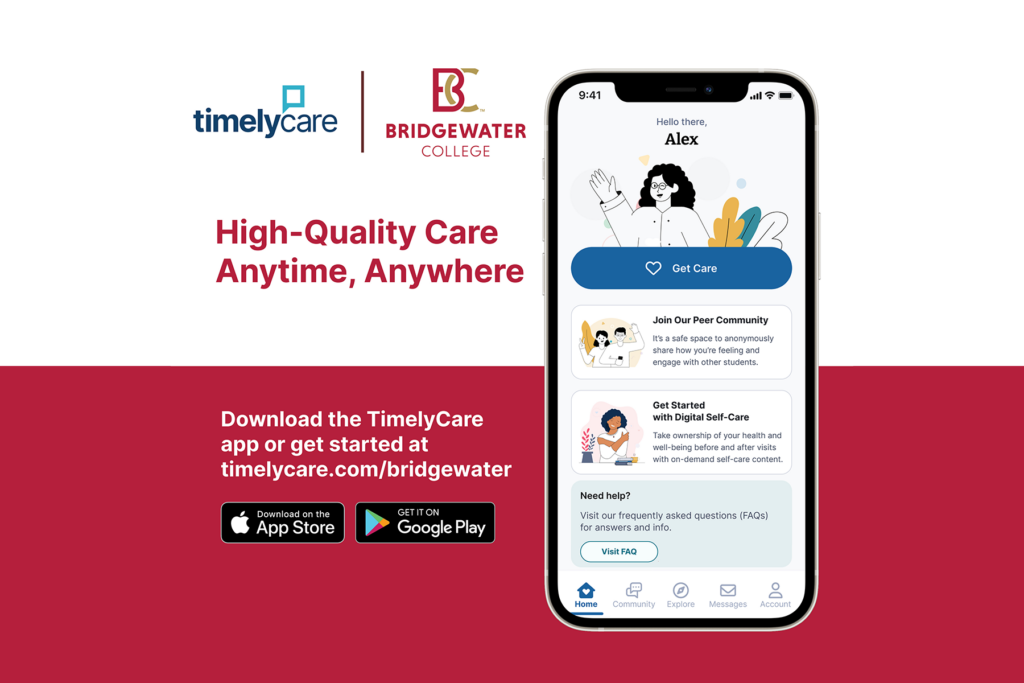
TimelyCare
The Bridgewater College Counseling Center is offering TimelyCare, a teletherapy service that offers licensed providers to support your mental well-being. TimelyCare offers:
- No cost, on demand support available 24/7
- Support from counselors via phone or secure video platform
- Service care options from a licensed mental health professional include individual and consultations from your smartphone or web-enabled device
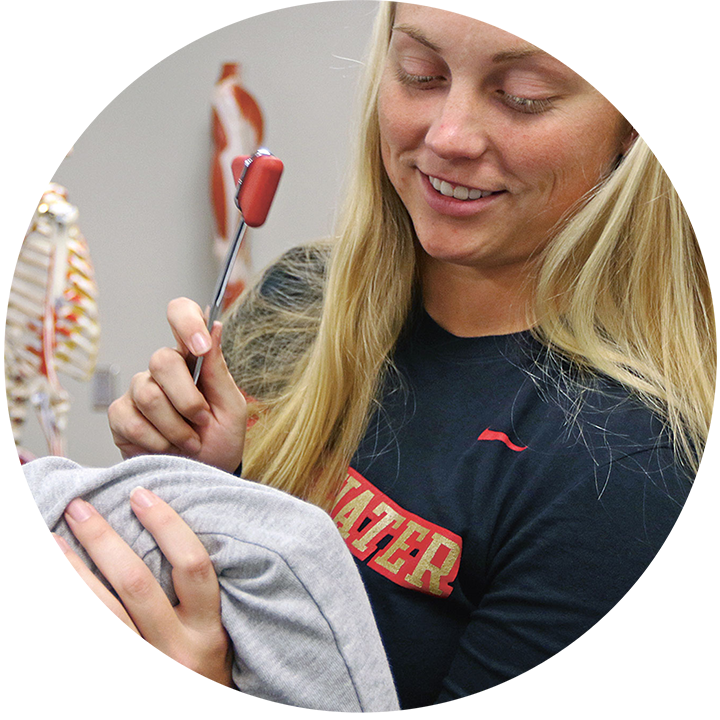
Healthy BC
Healthy BC is a coordinating committee that works with Student Health Services as well as state and local health departments to prepare for and to monitor public health concerns while promoting campus efforts for health and wellness at Bridgewater College.
Students seeking consultation, evaluation and treatment for non-emergency illnesses or questions about health records and immunizations should contact Health Services directly at healthservices@bridgewater.edu or 540-828-5384. For Emergencies, Dial 9-1-1.
Questions regarding health and wellness initiatives on campus can be found on this page or directed to any committee member below.
Dr. Leslie Frere lfrere@bridgewater.edu
Dr. Robert Hammill rhammill@bridgewater.edu
Kim Harper kharper@bridgewater.edu
Liz Howley ehowley@bridgewater.edu
Dr. Suellen Miller smiller2@bridgewater.edu
Kristy Rhea krhea@bridgewater.edu
Dr. Leona Sevick lsevick@bridgewater.edu
Meet the Staff

Liz Howley
Associate Vice President for Student Life
As Associate Vice President for Student Life, Liz has oversight for Student Conduct, Residence Life and Health and Wellness. Originally from Morgantown, W.V., she earned her B.S. and M.S. in public health from James Madison University. Outside of work, Liz stays busy with community work and her family.

Katie Seymour
Wellness Education Director
Katie is the Wellness Education Director at Bridgewater College. She earned her B.S. in Health Sciences from James Madison University in 2016 and M.P.H. from University of North Carolina Greensboro in 2019. She has been a Certified Health Education Specialist (CHES) since 2019. In her free time, she enjoys reading, sports and spending time with family and friends.
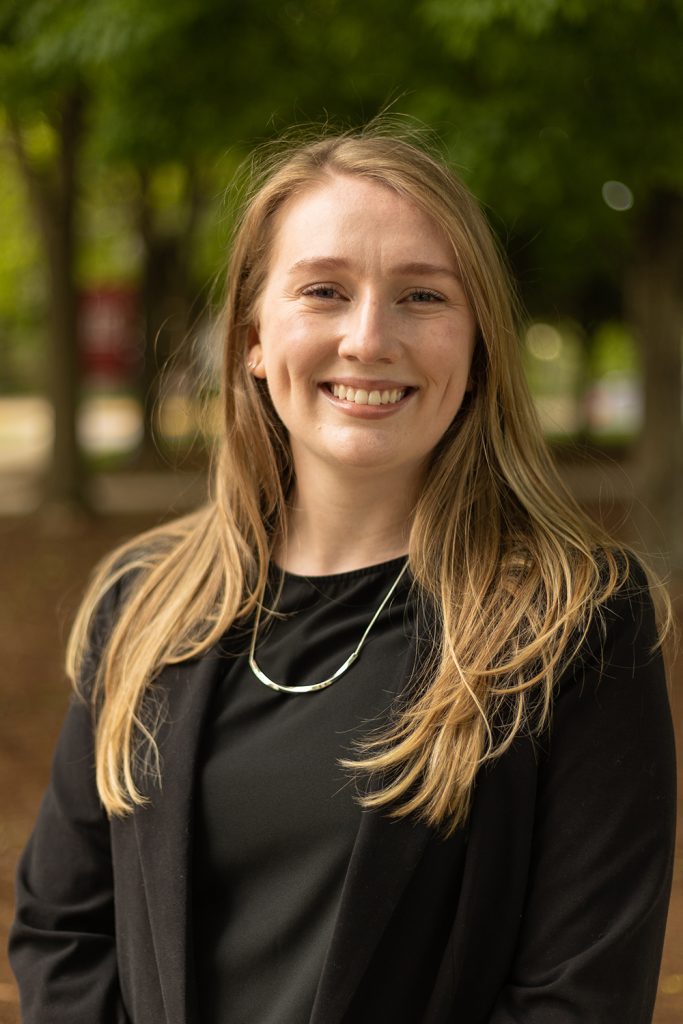
Shannon Pope
Case Manager for Student Success
Shannon received her bachelor’s degree in health and exercise science from Bridgewater College in 2017. She then attended the University of Virginia for her master’s in public health. Shannon began at BC as the Director of Student Wellness and Deputy Title IX Coordinator, and is now a Case Manager for Student Success. When she is not at work, she enjoys hiking, running, skiing and playing with her dog.
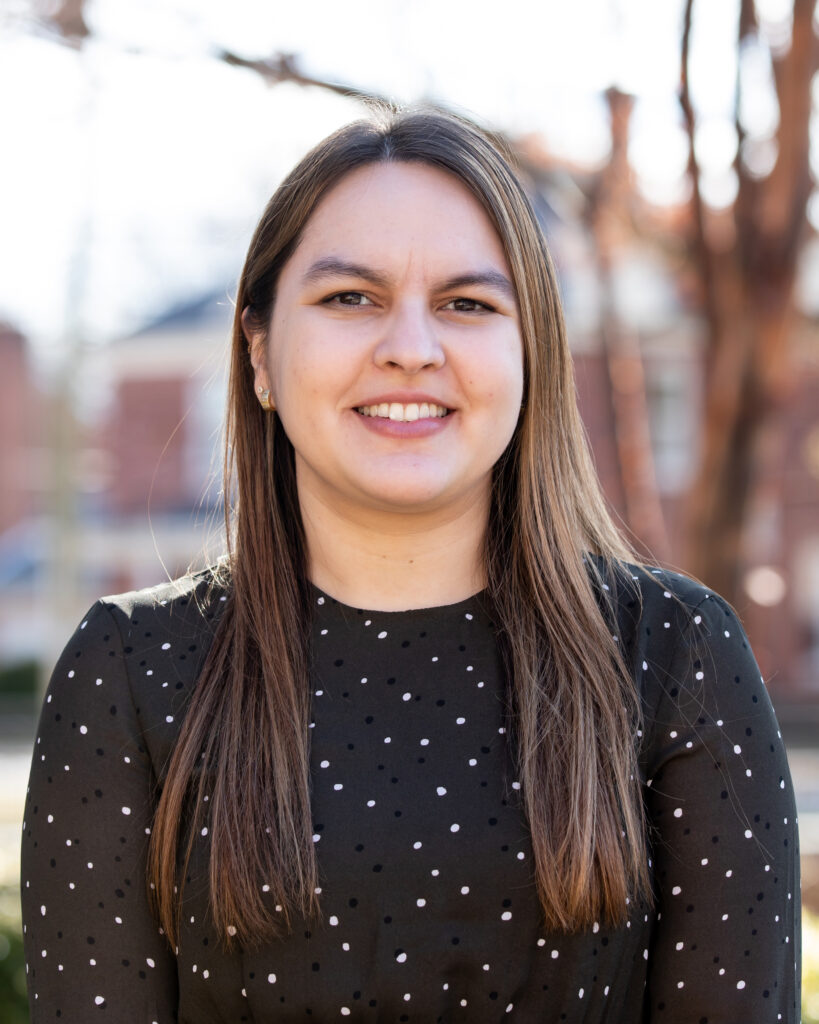
Fernanda Hernandez
Case Manager for Student Success
Fernanda is a two-time alum from Eastern Mennonite University receiving her B.S. in Business administration and M.A. in Organizational Leadership. She began her role at BC as Case Manager for Student Success in 2023. In her free time, she enjoys watching soccer, playing with her dog and spending time with her family and friends.
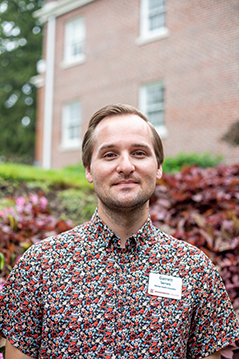
Garrett Serrels
Mental Health Counselor
Garrett Serrels works as a Mental Health Counselor in Counseling Services at Bridgewater College. A California native, he moved from the West Coast to the East Coast in 2005 and considers Virginia his primary home. He is a Licensed Resident in Counseling in the state of Virginia and is currently working toward his Licensed Professional Counselor (LPC) licensure. He holds a certificate in ecopsychology from Pacifica Graduate Institute and is working toward another certificate as a Therapeutic Game Master from Game to Grow. Garrett is passionate about working with community and collegiate mental health populations, primarily focusing on incorporating ecotherapy, play and mindfulness into his practice. Garrett received his bachelor of arts in psychology (‘18) from James Madison University and his master of arts in counseling degree (‘20) from Eastern Mennonite University. Outside of work, Garrett enjoys spending quality time hiking, camping, playing board games, reading and writing music with his wife, family and friends.
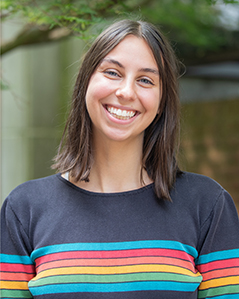
Vic Tedrow
Mental Health Counselor
Vic Tedrow serves as a Mental Health Counselor in Counseling Services at Bridgewater College. As a recent alum of Eastern Mennonite University (‘23), Vic received their Master of Arts in counseling and is a Licensed Resident in Counseling in Virginia. She is currently pursuing licensure as a Licensed Professional Counselor (LPC). Vic completed her bachelor’s degree from James Madison University (‘20) and fell in love with the Shenandoah Valley. Vic has an affinity for working with collegiate populations and promoting holistic wellness. Vic grounds their work in compassion, mindfulness and emotion-focused modalities. In her free time, Vic enjoys being outside, cuddling with her cats and volunteering with the Friendly City Safe Space.
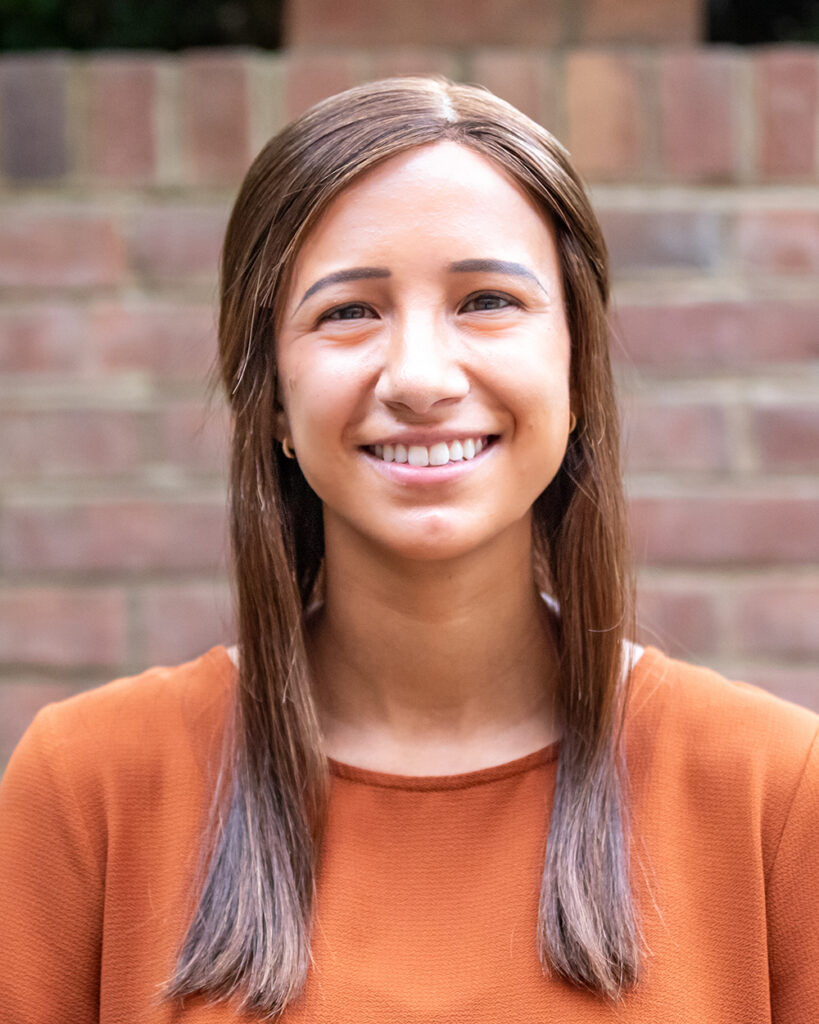
Sabrina Korrie
Counseling Services Intern
Sabrina Korrie serves as a counseling services intern at BC and is a graduate student at Eastern Mennonite University’s Master of Arts in Clinical Mental Health Counseling program. She was born and raised in Virginia and received her bachelor’s degree from James Madison University in 2019 where she studied communications and Spanish. Sabrina grounds her work in a person-centered approach and frequently incorporates elements from acceptance and commitment therapy and mindfulness-based practices. In her free time, Sabrina enjoys performing music, snowboarding, taking walks and spending quality time with friends.
